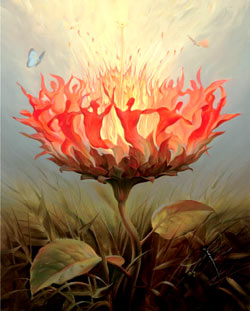Hari sab ur raha Govinda Radhey,
Yah vishvas tohin Hari tey mila dey
God resides in everyone’s heart, Govinda Radhey,
If you had complete faith in this, you would attain Him.
(Synopsis of a talk given by Jagadguru Shri Kripalu Ji Maharaj on July 3, 2010, in Mussoori, India, explaining this new kirtan verse.)
 Normally people say, hear and read that God resides in everyone’s heart. Besides Saints, God has also said in the Vedas,
Normally people say, hear and read that God resides in everyone’s heart. Besides Saints, God has also said in the Vedas,
“Asteetyevopalabdhavyas-tatva-bhavena chobhayoh…”
Katha Upanishad, 2/3/13. If someone were to truly believe that God dwelt in everyone’s heart, he would not need to do any spiritual practice. He would automatically become God realised.
It is very surprising that we have never seen our own self, but we always accept its existence. “The same ‘I’ that is me existed yesterday, and it is the same ‘I’ that existed the day before yesterday.” We are saying “I” and “me” 24-hours a day. This means we always sense our own existence, despite never having directly seen it. Similarly, wherever this sense of “I” exists, God also exists. We have learned about both of these from the Vedas.
“Dwa suparna sayuja sakhaya samanam vriksham…”
Shvetashvatara Upanishad, 4/7. The soul resides in the area near the heart. This means we reside there, the soul, and also God. God resides in the heart itself.
When we leave our mother’s womb, God is with us. When we leave this body at the time of death, God comes along with us. Wherever we go, no matter which type of birth we take, He is always with us. We naturally recognize our sense of self as “me”, but God is also there. He is with you, near you, always keeping an eye on you and noting your thoughts. He must be constantly vigilant in in case we surrender to Him at some point in time. What would happen if God felt sleepy and decided to take nap at that time? This would not happen.
He is always looking towards us. He is that kind of Father who is ever-hopeful, “He will surrender to me now. He will surrender now because he has met a true Saint and learned spiritual philosophy. Now he will surrender. Oh, today he received some rebukes from his father. His wife scolded hm. Now he will turn towards Me and surrender…”
In spite of God remaining ever-hopeful, our nature is like a dog’s curly tail. Even if you press it down thousands of times to straighten it, when you let go, it will again curl up.
So the Vedas asks us why we don’t accept this fact. When you accept your own existence without actually having seen it, then why don’t you accept God’s presence? Why don’t you have faith in this? Or you have faith, but only for a short time. You feel, “The Vedas, all the scriptures and Saints say it, so it must be so!” Then again you forget.
We have what we call private thoughts, and it is these very thoughts that have ruined us. When we feel we are alone with our private thoughts, we commit wrong actions and think wrong things. We forgot that we were not alone and God was noting our thoughts. He was using His divine x-ray machine.
 If we were to accept that God resides in everyone’s heart, then we wouldn’t feel animosity or act negatively towards anyone. We would be scared to cause them any harm. We wouldn’t even utter a single hurtful word to criticise someone and hurt them. But we do this especially in our own families! If someone says something even slightly negative to us, we must retort in such a way that it hurts them and they feel bad. We think about what to say so the situation escalates. We don’t do this with strangers, we do it with our own family members. We spew insults and criticisms. We forget that God is also seated in their hearts.
If we were to accept that God resides in everyone’s heart, then we wouldn’t feel animosity or act negatively towards anyone. We would be scared to cause them any harm. We wouldn’t even utter a single hurtful word to criticise someone and hurt them. But we do this especially in our own families! If someone says something even slightly negative to us, we must retort in such a way that it hurts them and they feel bad. We think about what to say so the situation escalates. We don’t do this with strangers, we do it with our own family members. We spew insults and criticisms. We forget that God is also seated in their hearts.
Par peeda sama nahin adhamayi.
There is no greater sin than hurting another. Even so, we forget this all the time. We keep on hurting others through our behavior and words, and we keep on thinking, “She is like this… He is just like that… But I am good!” You won’t think anything negative about yourself.
Your Guru has done such hard work for you. He has bestowed so much grace on you, yet you remain as you were in the beginning. We are not concerned in the least about our own spiritual welfare. If we were to die in the next moment, what would happen? We should think deeply about this. Think about your spiritual welfare. And don’t have faith in the longevity of your body. You may have faith in all else, but not in this.
 There was a hale and hearty wrestler. He was going somewhere, met an accident and died. He didn’t think about this moment happening. There was an important prime minister or president. He died in a helicopter accident or his plane crashed. He may have just been driven somewhere, had an accident and died. Someone may slip in the bathroom, strike his head and die. Falling is just an excuse. The real reason is that everyone’s time of death is pre-determined.
There was a hale and hearty wrestler. He was going somewhere, met an accident and died. He didn’t think about this moment happening. There was an important prime minister or president. He died in a helicopter accident or his plane crashed. He may have just been driven somewhere, had an accident and died. Someone may slip in the bathroom, strike his head and die. Falling is just an excuse. The real reason is that everyone’s time of death is pre-determined.
God remains in everyone’s heart. When our time is up, He says, “Let’s go!” If a person says, “Can I have a few more seconds?” God says, “No, it’s time to go. But I am coming with you!” He doesn’t just take the sinners like this, it happens to everyone. Even Saints follow these rules. Adi Shankaracharya left this world at the age of thirty-two. Although, in reality these rules of death don’t apply to Saints. A Saint has the power to leave at any time or extend his time. If they follow these rules anyway – this is a separate point.
Therefore, a soul under Maya should remain vigilant every moment. He should not have faith in his longevity, and he should have faith that God dwells in everyone’s heart. He should remember these two points.
© Radha Govinda Samiti and Bhakti Bliss













